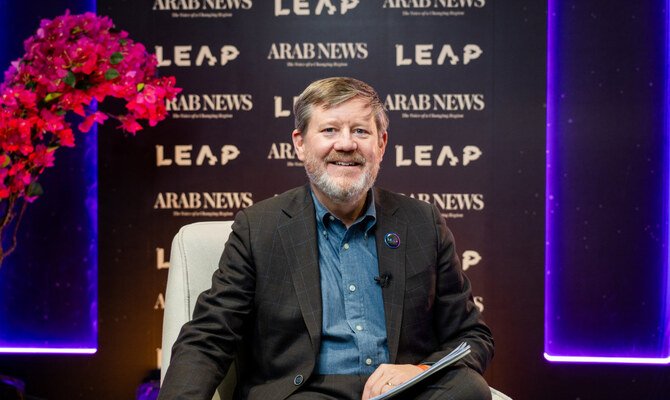Saudi Arabia- As Saudi Arabia intensifies its drive to adopt artificial intelligence, the Kingdom’s commitment to establishing a robust regulatory framework is becoming a significant catalyst for fostering US-Saudi collaboration. This was the key takeaway from an exclusive interview with Steve Lutes, Vice President for Middle East Affairs at the US Chamber of Commerce. The interview was held at the LEAP 2025 technology conference in Riyadh.
Lutes highlighted the importance of a clear and transparent policy environment in creating the confidence necessary for investors, innovators, and risk-takers. He emphasized that such a framework not only attracts investment but also drives innovation. This further strengthens the relationship between Saudi Arabia and the United States in AI and beyond.
“The regulatory environment is crucial in providing clarity and confidence, which are the foundation for investors to take risks and innovate,” Lutes stated. He added that Saudi Arabia’s open-door policy with the US Chamber of Commerce plays a pivotal role in shaping this regulatory framework. Consequently, it ensures that the Kingdom stays at the forefront of global technological advancements.
According to recent announcements, Saudi Arabia aims to increase its trade and investment ties with the US to a target of $600 billion over the next four years. This ambitious plan was outlined by Crown Prince Mohammed bin Salman during discussions with US President Donald Trump. It signals the Kingdom’s long-term commitment to strengthening economic and technological cooperation.
Lutes pointed to Saudi Arabia’s young and tech-savvy population as a crucial asset in the country’s quest to lead in AI innovation. With a workforce eager to embrace new technologies, the country’s Vision 2030 initiative is positioning Saudi Arabia to become a global leader in tech adaptation and innovation.
“Saudi Arabia is a young nation with a dynamic workforce that is embracing technology and actively contributing to both public and private sector innovation,” Lutes explained. He further emphasized that a combination of talent development and a supportive regulatory environment will be essential to scaling AI businesses in the Kingdom.
Another critical area of focus is ensuring that Saudi Arabia has access to cutting-edge US technology, particularly high-performance AI hardware such as Nvidia’s advanced chips. Lutes noted that access to this technology is integral to the Kingdom’s broader innovation ecosystem. This will ultimately fuel its growth in the AI sector.
While security concerns are a priority, Lutes stressed the importance of finding a balance that allows strategic allies like Saudi Arabia to benefit from the latest US technologies. “While security measures are important, it’s essential that our partners, including Saudi Arabia, have access to advanced technologies to support their technological growth,” he said.
The ongoing partnership between US companies and Saudi Arabia, particularly in the AI sector, is already yielding impressive results. US firms are making significant contributions to the Kingdom’s tech-driven transformation. Lutes expressed confidence that this collaboration will only continue to grow, fostering job creation, increased investment, and greater innovation in both countries.
“I’m optimistic about the future of US-Saudi collaboration in AI,” Lutes remarked. “Diplomacy will play a key role in ensuring that both nations continue to work closely together to achieve shared goals.”
Lutes concluded by highlighting the importance of private-sector leadership in accelerating US-Saudi partnerships. He emphasized that a strong regulatory framework, access to technology, and continued collaboration will fuel future growth for both nations.


